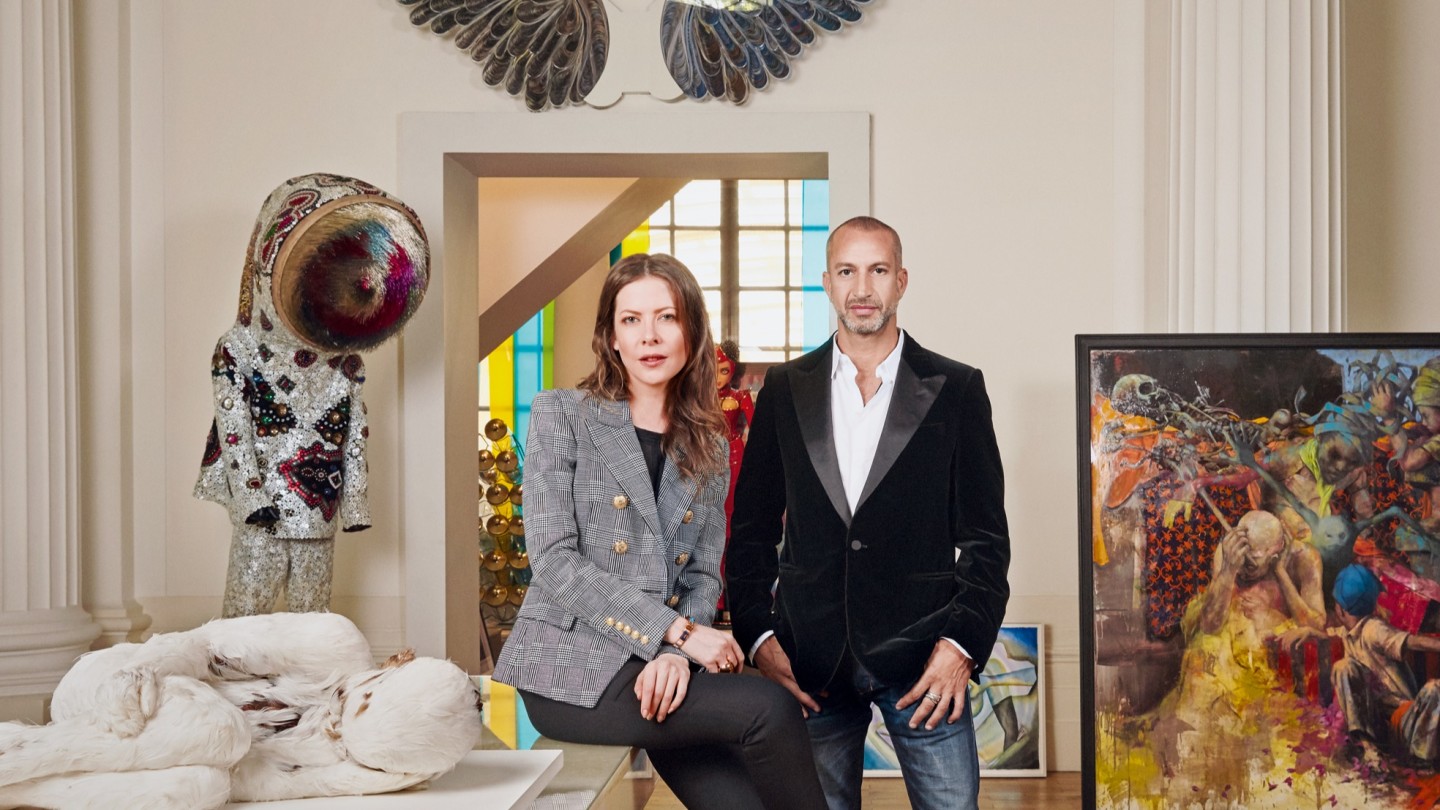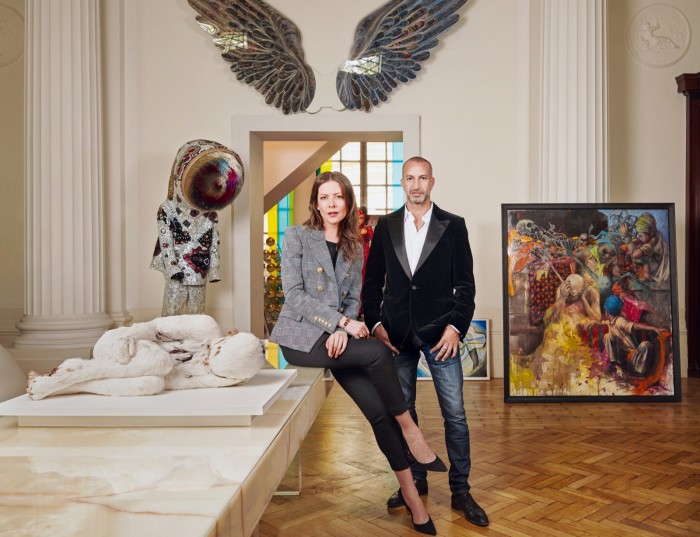A dramatic collection of contemporary figurative art

Roula Khalaf, Editor of the FT, selects her favourite stories in this weekly newsletter.
Art is not a passing fad for businessman and hotelier Rami Fustok, whose highly personal collection reveals a taste for the dramatic. This is a body of work that demands attention. As does his home – a listed Victorian former governmental building in north London he has lived in for nearly 15 years. In the reception space is a life-size white resin sculpture of a winged angel. “I love the shape, the elegance, the sensuality,” Fustok says of the piece. It is indicative of his penchant for the figurative and sculptural – an interest he has developed over the past five years with the help of Blain/Southern gallery director Deanna Leontieva.
But the celestial figure is not a gallery purchase. It is, in fact, the work of Fustok’s mother, sculptor Bushra Fakhoury, with whom he moved to London from Lebanon at the age of five. “Her studio was at home so I’ve always been surrounded by art. I guess it’s in my DNA,” says Fustok. But while he dabbled with art in his youth, it was in business that he made his name, starting out in his family firm in Saudi Arabia. “We primarily sell firefighting and rescue vehicles to the Saudi Aramco oil company,” explains Fustok, who worked in the industry for 20 years while launching a number of side ventures, including a cigar bar in Riyadh and investing in First Model Management in London.
“I was successful, but it didn’t enrich my soul,” he notes. He came up with an idea for his own passion project seven years ago: “I wanted to create an extraordinary London hotel. I thought, ‘Let’s build something that transports people to another universe, where all the senses are accentuated.’” The result is The Mandrake, a boutique hotel in Fitzrovia that opened in 2017 and has attracted a glamorous and hedonistic clientele with its decadent design. “The Mandrake is an extension of my character,” says Fustok, adding that his interior designer sister worked on the decor and there are paintings in the rooms by his artist brother. “I put my heart into it.”
Indeed, the extravagance of The Mandrake is reflected in Fustok’s home, with sculptures and paintings throughout – and a prevailing contrast between dark and light. “I think life is a duality, in the world and within ourselves. I’m just trying to find the right balance.” Thus the appeal of German painter Jonas Burgert, whose large-scale canvases are rendered with fantastical figures, deep chiaroscuro and a sense of the gothic. Fustok is now one of the largest European collectors of Burgert’s art – which is what brought him into contact with Leontieva, an art consultant who owned her own space in Paris before joining Blain/Southern six years ago.

“I was working at the gallery when Rami walked in and said, ‘You have to find me this painting,’” Leontieva recalls. “He was pointing to a piece by Burgert, one of our most high-profile artists. The specific painting was unavailable, but the conversation started from there.” The pair went to visit the artist in East Berlin. “They got along instantly,” says Leontieva, “and Jonas was touched by Rami’s vision.” So much so that he agreed to a rare painting commission (€80,000) – an assembly of almost demonic apparitions. Another Burgert acquisition is a canvas called Bleibleib (€225,000 from Blain/Southern): a monumental, classically draped female figure that hangs in his bedroom.
His home collection also includes a surreal, life-size, glitter-covered figure by Nick Cave, one of the American sculptor and performance artist’s Soundsuits, which was purchased from Jack Shainman Gallery in New York for $100,000; a sculpture of a curled-up child coated in white feathers by Somerset-based Lucy Glendinning, purchased from the Royal Academy for £12,000; and paintings by old masters-inspired Russian artist Maria Kreyn, including End of Era of Time (£25,000), an oil-on-canvas of angelic figures that Fustok acquired direct from her New York studio. Another angel-themed artwork hangs over a doorway in the living space – a set of wings made of sliced strips of paper by Greek artist Pavlos Dionyssopoulos, bought from London’s Opera Gallery for €160,000.
“Rami is a passionate collector,” says Leontieva. “I have never seen anybody make a decision so quickly. It’s either an immediate yes or an absolute no. He knows exactly what he wants.” Fustok agrees: “She throws a lot of things my way, but I’m very particular about what I buy and 99 per cent of the time I say no.” He has, however, said yes to a piece by British sculptor Lynn Chadwick, a sculpture by Japanese installation artist Chiharu Shiota, and five pieces by Francesco Clemente – including Refuge ($45,000), his favourite.
Securing artworks for The Mandrake has also been rewarding for Leontieva. “I was very taken with Rami’s idea for this sophisticated but edgy place.” It’s now also home to the overflow of his collection, which is always growing. “I buy art because it’s meaningful to me,” says Fustok, whose fantasy acquisition is a Francis Bacon. “It’s never an investment.” Except once, when he bought a Jeff Koons Dom Pérignon Balloon Venus champagne bottle for £15,000 – another of the same edition sold recently for more than £50,000 at a Phillips auction. It’s a cult piece by a huge name, but that doesn’t mean it speaks to Fustok on a personal level – which makes his collection so refreshingly idiosyncratic.
Comments